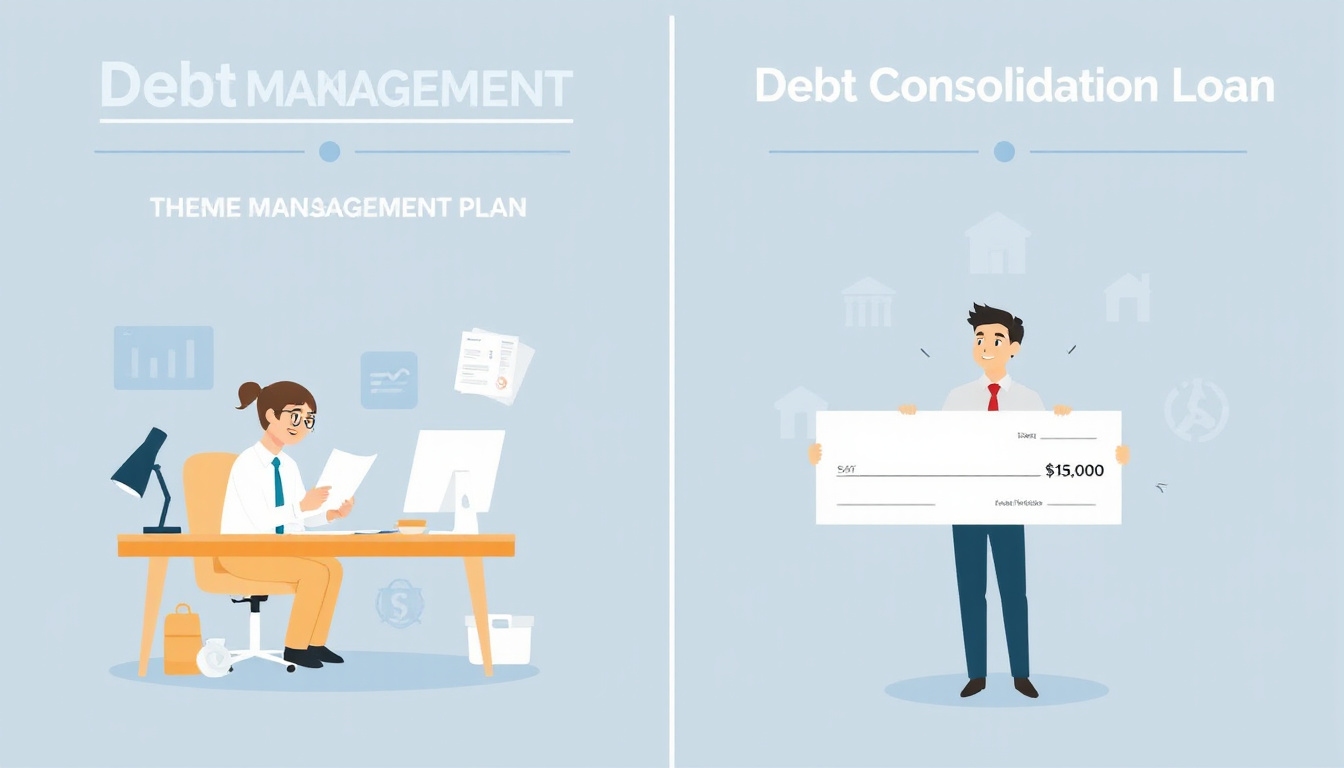Managing debt effectively is a crucial aspect of maintaining financial stability, yet many Canadians find themselves overwhelmed by various debt relief options. Two common terms that frequently arise in this context are ‘Debt Management Plans’ (DMPs) and ‘Debt Consolidation Loans.’ Understanding the differences between these two approaches is essential for making informed financial decisions that can lead to a healthier financial future. In this article, we will delve into the definitions and overviews of both options, providing you with a comparative analysis that highlights the key differences and considerations. By the end, you’ll have a clearer understanding of what each option entails and how to choose the best strategy for your financial situation.

Key Takeaways
- A Debt Management Plan (DMP) involves working with a credit counseling agency to manage payments to creditors, while a Debt Consolidation Loan combines multiple debts into a single loan with one monthly payment.
- DMPs typically may lower interest rates or waive fees but require a commitment to a repayment plan, whereas debt consolidation loans often have fixed interest rates and may depend on credit scores.
- Using a DMP can help improve credit over time through consistent payments, while debt consolidation loans can provide immediate financial relief but may not guarantee long-term credit improvement.
- DMPs usually work best for individuals seeking structured help with unsecured debts, whereas consolidation loans may be suitable for those with sufficient credit to qualify for lower rates.
- Consider your financial situation and long-term goals when choosing between a DMP and a debt consolidation loan.
Definition and Overview of Debt Management Plans
Debt management plans (DMPs) are structured repayment arrangements designed to help individuals manage their unsecured debts more effectively. A DMP involves working with a credit counselling agency or financial expert, who will negotiate with creditors on your behalf to establish a more manageable monthly payment based on your financial situation. Typically, these plans can reduce interest rates and waive late fees, making repayment easier over a predetermined period, usually three to five years. In contrast, many people wonder, ‘What is the difference between a debt management plan and a debt consolidation loan?’ The key distinction lies in their structure: while a DMP focuses on negotiating terms directly with creditors and does not involve taking out new loans, a debt consolidation loan allows you to combine multiple debts into a single loan, often with a lower interest rate, but can come with fees and potentially increased debt if managed poorly. Understanding these options can significantly impact your financial recovery strategy.
Definition and Overview of Debt Consolidation Loans
Debt consolidation loans are a popular financial tool used to streamline and manage existing debts by combining multiple loans into a single loan with a potentially lower interest rate. This process not only simplifies monthly payments but can also reduce the overall interest paid over time. When considering debt relief options, many Canadians wonder, ‘What is the difference between a debt management plan and a debt consolidation loan?’ While both options aim to help individuals manage their debt, they operate differently. A debt management plan (DMP) typically involves working with a credit counselling agency to negotiate lower interest rates and create an affordable repayment schedule, while a debt consolidation loan involves borrowing a new loan to pay off existing debts, thereby consolidating them into one payment. Understanding these distinctions is crucial for Canadians seeking effective solutions to regain control over their financial situation.
‘The only way to get out of debt is to pay it off, and that takes discipline, planning, and sacrifice—whether through a management plan or consolidation.’ – Unknown

Comparative Analysis: Key Differences and Considerations
When exploring options for managing debt, it’s crucial to understand the differences between a Debt Management Plan (DMP) and a Debt Consolidation Loan. A DMP is a structured plan offered by credit counselling agencies to help consumers repay their unsecured debts through a single monthly payment, which is distributed to creditors. This approach often includes negotiated lower interest rates and waived fees, allowing individuals to pay off their debts over a set period, typically three to five years. On the other hand, a Debt Consolidation Loan involves taking out a new loan to pay off existing debts, thereby consolidating multiple payments into one. While this option can simplify repayment and sometimes offer better interest rates, it also means you are incurring more debt. Additionally, DMPs may protect consumers from creditor actions during the repayment period, whereas consolidation loans do not necessarily offer the same protections. Ultimately, the choice between a DMP and a debt consolidation loan will depend on an individual’s financial situation, ability to manage payments, and comfort level with accruing new debt.
